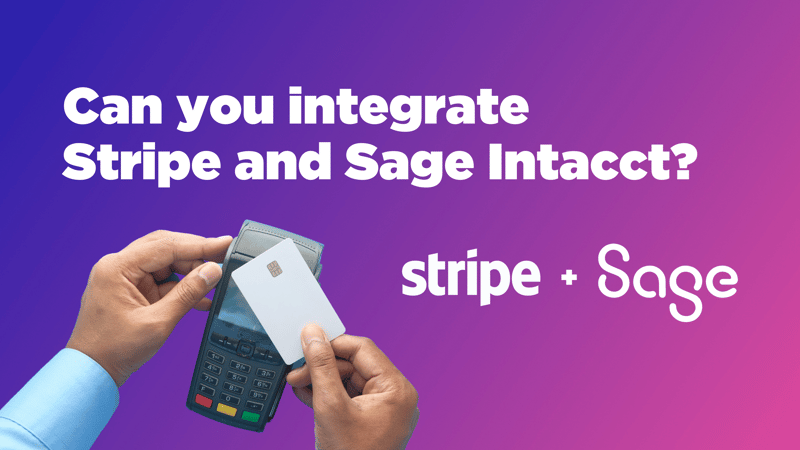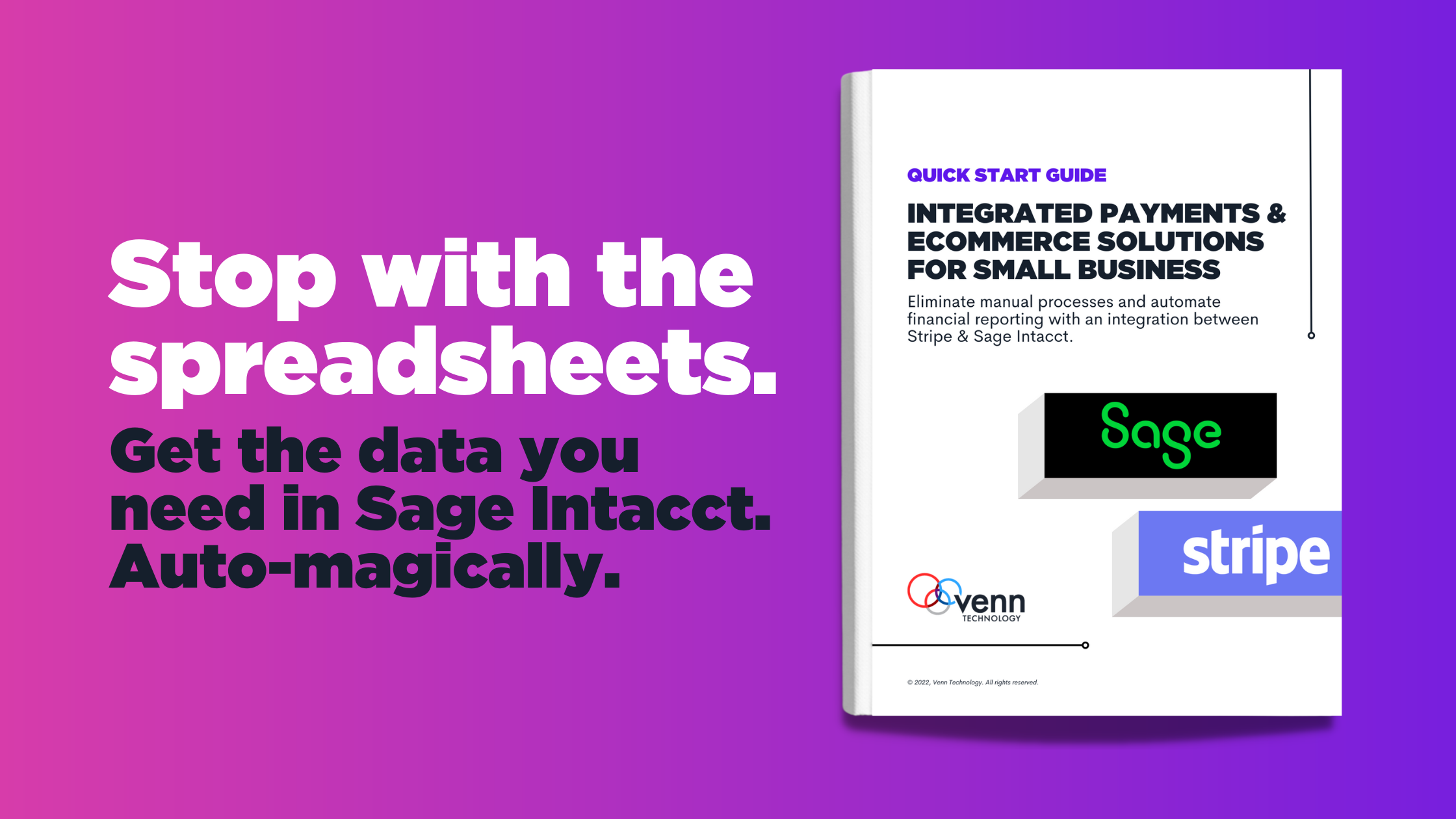Can you integrate Stripe and Sage Intacct?
Written byRandle Haggerty

Yes! Integrating a financial infrastructure platform to your accounting software is more important than ever.
According to an Expectations & Experiences: Consumer Payments report, a majority of consumers want to have multiple payment options when paying bills. Additionally, 84% of respondents say having the option to pay by credit card is a must-have or nice to have, followed by 79% who said paying by debit card was a must-have or nice to have.
Connecting Stripe to Sage Intacct not only provides a better experience for customers, it adds tons of value in other places too. Integrations help businesses:
• Manage recurring billing
• Automatically generate invoices
• Sync transactional data in real-time
• Seamlessly issue refunds without manual effort
• Provide a better customer experience
• Collect on invoices faster
What's the difference between a standard and custom Stripe Sage Intacct Integration?

Pre-built or standard Sage Intacct Stripe integrations are designed to sync transactions from Stripe to the Sales Order Document object inside of Sage Intacct. From there, it can create sales invoices, customer records, and accounts receivable (AR) payment details. Other aspects of a standard integration include:
• Keeping track of fees associated with an order
• Grouping journal entries in general ledger (GL) batches
• Accounts receivable (AR) adjustments for reversals/refunds from Stripe
Custom Sage Intacct Stripe integrations give you the ability to:
• Create AR invoices
• Reverse contracts, create contract invoices, and set up auto-pay for invoices in Stripe
• Use the auto-advance tool with payment methods that are already in customer records
• Effectively create your own billing subscription method inside of Sage Intacct
• Sync transactional data across more than two systems
How long does it take to implement a Stripe to Sage Intacct integration?

Both platforms have open application programming interfaces (APIs), so integrating certain types of data is more accessible and customizable. APIs are like a set of rules and guidelines for integration experts to use when connecting to other cloud-based platforms that also have an API.
Integrations can be done in a variety of ways, but for our case, we use a low-code/no-code option called middleware to efficiently build out automated workflows between systems. Middleware solutions like Workato, Jitterbit, or Tray.io have built-in error handling mechanisms so teams are alerted when the integration isn’t working properly, and they provide a way to make quick edits to the integration as businesses continue to scale.
In our experience, a standard Sage Intacct Stripe integration can be implemented in as little as three weeks, depending on the level of customization and testing prior to deployment.
Common Use Cases

Integrations can be built to accommodate one-way or bidirectional syncs between Stripe and Sage Intacct depending on your requirements. Here are some of the most common scenarios we see:
1. Incoming Invoices/Charges
Software as a Service (SaaS) companies often use Stripe billing and subscriptions to charge customers on a set cadence. Every time a customer pays, that payment syncs to Intacct and generates an invoice.
Nonprofit organizations accept one-time and recurring donations as charges. Donations primarily go through the Order Entry module in Intacct, and then an Accounts Receivable (AR) Payment is created. See this use case in action.
Businesses running online stores, often using a front-end payment processor such as Stripe in combination with an online storefront like Shopify, bring invoices into Intacct to efficiently keep track of inventory, products, returns, and more.
2. Outgoing invoices
Companies with low volume and high dollar business-to-business (B2B) sales often sync invoices from Intacct to Stripe. The added functionality of our “Pay Now” button with a unique payment URL on the invoice makes it easier for customers to make payments.
Organizations giving customers multiple ways to pay can create invoices using Intacct’s standard functionality while also providing a Stripe-hosted payment link, staying within the Payment Card Industry (PCI) standards. Business can give customers a faster, more secure way to use different payment methods depending on transaction types.
3. Contract Invoicing
Businesses doing full cycle subscription billing such as memberships, recurring donations, and more can use the functionality in the Contracts module inside of Intacct to generate contract invoices and automatically charge customers on file in Stripe.
Frequently Asked Questions
Q: Does Stripe integrate with Shopify?
A: Yes, Stripe and Shopify can be integrated to enable data sync between applications. We’ve integrated hundreds of applications, including Stripe and Shopify to Sage Intacct. Where there is an API, we have the ability to build integrations and, in many cases, we are building connections between more than two applications.
Q: How do nonprofits use a Stripe and Sage Intacct integration?
A: We work closely with small to medium-sized businesses and nonprofits to understand their unique processes and build an integration that fits their needs. Many nonprofits use Stripe and Intacct to manage memberships/subscriptions, recurring donations, and point-of-sale transactions such as event tickets or merchandise.
Q: What other payment gateways can integrate to Sage Intacct?
A: Any system with an API can be integrated with Sage Intacct. We’ve done integrations with PayPal, Authorize.Net, PayTrace, Square, and more. That being said, not all payment gateways have the same functional API as Stripe does, so the integration may not be as flexible for certain needs.
Sage Intacct Integrations with Venn Technology
Syncing data from Stripe to Sage Intacct benefits businesses internally and externally. A majority of consumers prefer the option to have multiple payment options, and it is often every business’ goal to meet those needs while getting their accounting teams the data they need to manage billing, generate invoices, and ensure payments are collected on time.
Venn Technology is an award-winning Sage Tech Partner who specializes in Sage Intacct integrations to other core applications. We work closely with SMBs and nonprofits to tailor and maintain automation solutions for them. Rather than simply providing a tool to build integrations, our team of experts conduct an analysis of your organization and collaborate with your team to identify the right solution.
Need help integrating your apps to Sage Intacct?

About the Author
Randle Haggerty
Marketing Manager

